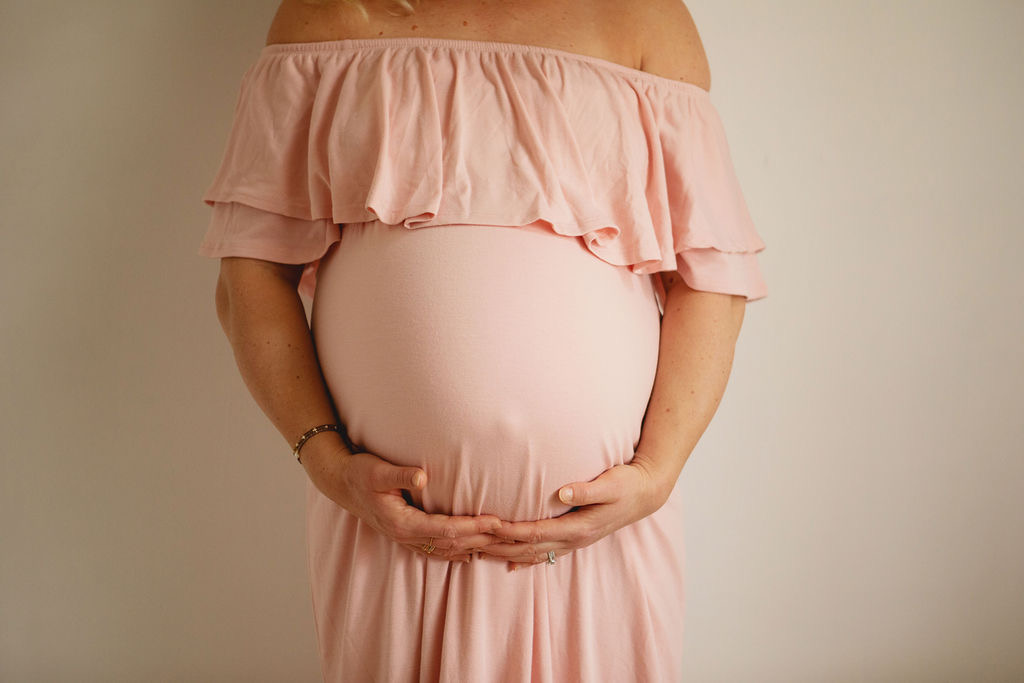There are very few moments in life that feel immensely emotional, invigorating, and daunting like a positive pregnancy test. For many, it’s both a joyous milestone and a privilege—the beginning of a long-awaited chapter! While the journey is slow and setback-ridden for some, conceiving is quick and effortless for others. But either way, it’s filled with high expectations and an equal amount of uncertainty. For us, getting pregnant with our first child was a winding road. After my PCOS diagnosis in 2017, I knew conceiving would be challenging (to say the least). Fortunately, getting pregnant with polycystic ovary syndrome is possible. And we’re living proof.

My hormonal imbalances
If you’re new around here, let’s rewind. From 2011-2015, I was in a daily battle with my body. Fueled mostly by my ego, my physical goals were superficial and all-consuming. Vanity was the name of the game. On a routine basis, I worked diligently to mold and shape my body into a far leaner version of what it is today. For what it’s worth, I thought I was being healthy. But in many ways, my perspective of health was shallow. Between overexercising and under-eating, my hormones were completely imbalanced: my progesterone and estrogen were low, and my testosterone was high.
Are your hormones imbalanced? Get my hormone-balancing eBook to heal your hormones holistically!
HOW PCOS AND exercise IMPACTED MY HORMONES
Fast forward to my mid-20s. Shortly after meeting my husband, my focus shifted. I learned, ever so slowly, how to make peace with my body. During that time, I leaned heavily into self-acceptance, body kindness, and courage. I found myself inspired by Registered Dietitians who spoke about finding peace with their bodies too. I decided, assertively, to change my habits. This process wasn’t easy, but mental growth—in any capacity—never is. But even after I loosened my grip on rigorous exercise and strict food rules, getting pregnant seemed out of reach. Thanks to toying with my body’s natural set point for years (and a long stint on birth control) my menstrual cycle was anything but regular. Then, in 2017, I was diagnosed with PCOS.

What Is PCOS?
Polycystic ovary syndrome—commonly known as PCOS—is a very common hormonal disorder among women of reproductive age (in fact, it’s estimated that it impacts close to 13% of women!). While it manifests differently in females, typical symptoms include irregular menstrual cycles, excess androgen levels (male hormones), and polycystic ovaries (ovaries with numerous small cysts). In turn, PCOS can lead to various symptoms: infertility, weight gain, acne, and excessive hair growth. Fortunately, you can put this condition into remission! While it can’t be cured, completely, its impact on daily life can be greatly improved with diet and lifestyle habits.
My PCOS Diagnosis
After years of struggling with an irregular cycle, I sought help from a functional medicine doctor in Colorado. She was the first person to diagnose me with polycystic ovary syndrome—and I learned it’s both a hormonal and metabolic condition. She also told me I had an under-active thyroid, likely due to the years I spent over-exercising, not managing my stress, not eating enough calories, etc. Despite the news, I was determined to regulate my cycle. Not only for the sake of my fertility, but for the sake of my overall health.
natural remedies for PCOS
Under the care of my functional medicine doctor, I tried a few different things. First, I temporarily limited gluten and dairy (I noticed no change with this, however). I began seed cycling. I took a thyroid medication, for six months, to reverse my hypothyroidism. Furthermore, I opted for more gentle exercise, started routine acupuncture, and increased my consumption of healthy fats and fiber, all in the name to improving my hormones and blood sugar. Beyond these things, I also moved on from a stressful job, graduated as a holistic health coach, and embraced new hobbies.
My hormone-balancing eBook can help you get started on healing your PCOS symptoms!

Balancing my hormones
Everything—from food, supplements, and lifestyle choices—proved beneficial. I let my body speak for itself, tuning into its intuitive needs. I loosened my grip on my rigid routine, even on days I didn’t want to. Eventually, it paid off. Almost two years after my diagnosis, I regained a more regular menstrual cycle! But during those dynamic years, I put in daily, consistent work. I learned that healing from a hormone imbalance is not linear. Trial, error, and a lot of patience were my guiding lights.
combining Eastern and Western Medicine
Fast-forward to 2019. With ovulation still all over the map, my OB/GYN and I talked about different ovulation medicines. Ultimately, we decided on Clomid. One of the symptoms of PCOS is irregular ovulation, which can increase infertility. Thankfully, Clomid did the trick. After just two rounds—a very short time period in the scheme of things—we found out we were expecting.
While Western medicine played a huge part, I also took a holistic, informed approach to getting pregnant with polycystic ovary syndrome. Leading up to my pregnancy, I got routine acupuncture, maintained mindful exercise, and ate plenty of nutrient-dense foods. About six months before we conceived, I sought support from a PCOS-focused RD. She guided me through my entire pregnancy via supplements and meal suggestions. As soon as we started working together, I began taking a prenatal vitamin, as well as upped my zinc, vitamin b12, and magnesium.
Please speak with your doctor before making any changes to your supplement routine.

Fertility resources
In writing my story, I hope it brings hope and optimism to getting pregnant with polycystic ovary syndrome. I often remind myself that every woman’s journey to conceiving is uniquely hers. There is no gold standard and trust, along with patience, are essential. To all the mamas-to-be out there, those anxiously awaiting to give birth, know that I’m sending strength and bravery your way. If you’re on a similar journey, take a look at my fertility checklist and hormone-balancing eBook.
This article is for informational purposes only. It is not, nor is it intended to be, a substitute for professional medical advice, diagnosis, or treatment and we recommend that you always consult with your healthcare provider.
Photos by @jackie_segedin.



Leave a Reply